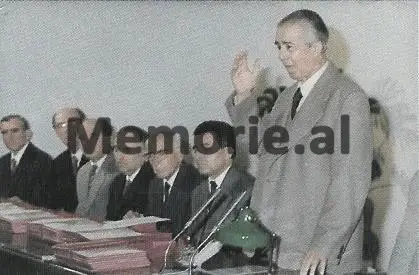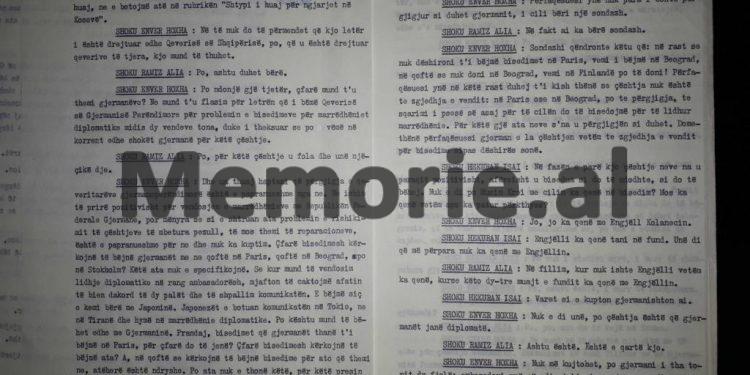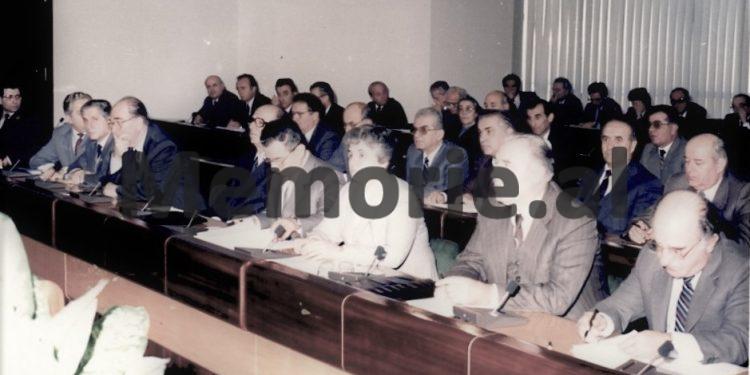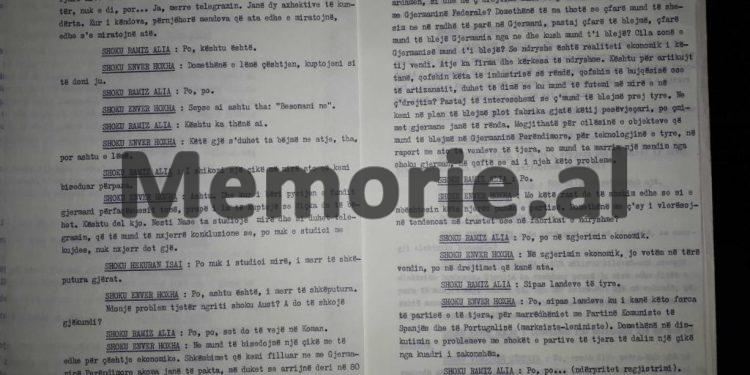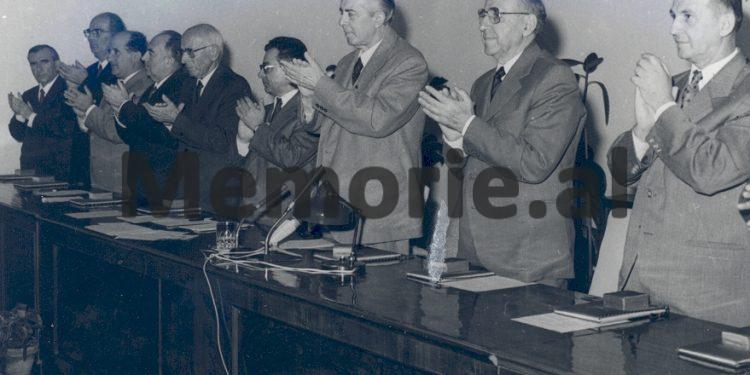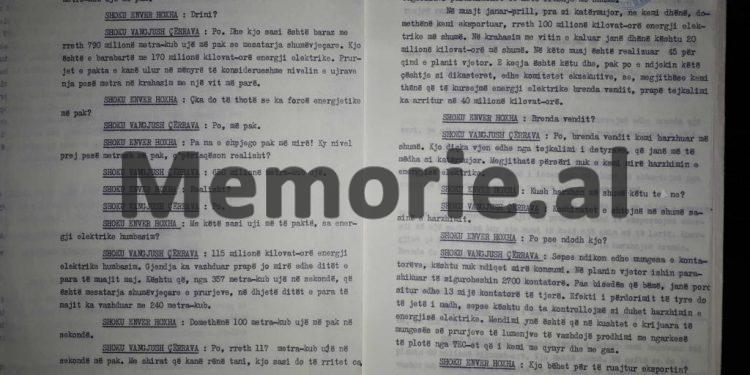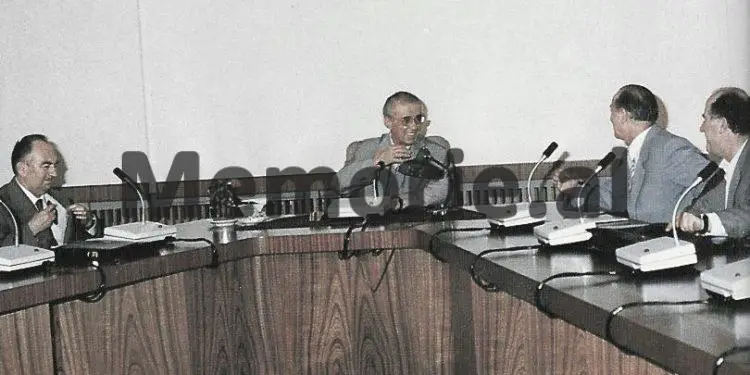Dashnor Kaloçi
The fifth part
Memorie.al/ publishes some archival documents extracted from the Central State Archive in Tirana (Fund of the former Central Committee of PPSh), which contain the acronym “Secret” and “Top Secret” and belong to a period from January from 1982 until September 1983, where there is a voluminous file with minutes of meetings of the Secretariat of the Central Committee and the Political Bureau of the Central Committee of the PPSh, meetings which were chaired by its General Secretary, Enver Hoxha, where they assisted: Ramiz Alia, Adil Çarçani, Manush Myftiu, Hekuran Isai, Rita Marko, Pali Miska, Hajredin Çeliku, Haki Toska, Simon Stefani, Lenka Çuko, Muho Asllani, Vangjel Çerrava, etc., as the main topic is analysis about the “hostile activity” of Mehmet Shehu and his close collaborators, from Fadil Paçrami, Todi Lubonja, Beqir Balluku, Petrit Dume, Hito Çako, Abdyl Këllezi, Koço Theodhosi, Kiço Ngjela, Vasil Kati, Kadri Hazbiu, Fiqret Shehu, Feçor Shehu, Mihalla q Ziçishti, Llambi Peçini, etc. In the file available to Memorie.al, in addition to the analysis of the “hostile activity of the police agent Mehmet Shehu and his associates Beqir Balluku and Kadri Hazbiu”, in the meetings of the Political Bureau and the daily meetings of the Secretariat of the PPS Central Committee, are analyzed also the activity of the Ministry of Internal Affairs and State Security, with its agency and collaborators, inside and outside the country, the reports and relations of the Albanian state with different countries of the world, such as: the USA, the Soviet Union, West Germany, England, Spain, Italy, as well as those with neighbors, such as Greece and Yugoslavia and the demonstrations in Kosovo, how the world press presented Socialist Albania, the talks with West Germany about the War reparations payments, meetings and conversations with party leaders Marxist-Leninists from different countries of the world, such as Ernst Aust, Zhoao Amazonas, Fosko Dinuçi, etc., regarding the “suicide of Mehmet Shehu”, the problems of Polish immigration Albanian refugees, in different countries of the world, and the change of the exchange rate of the dollar in the remittances, which they made to their relatives in Albania, up to numerous economic problems, from heavy industry, hydropower plants on the cascade of the river Drin, energy import and export, etc., etc.
Continues from last issue
The secret document with the minutes of the daily meeting of the secretaries of the Central Committee of the PPSh, held on May 15, 1982, regarding the meeting of Ramiz Ali with Ernst Aust, chairman of the Marxist-Leninist party of West Germany and the country’s hydropower situation OUR
DAILY MEETING OF SECRETARIES OF THE CENTRAL PARTY COMMITTEE MAY 15, 1982
SECRET
COMRADE ENVER HOXHA: In economic expansion, not only in the whole country, but in the directions they have.
COMRADE RAMIZ ALIA: According to their countries.
COMRADE ENVER HOXHA: Yes, according to the countries, where they have these party forces and others, for relations with the Communist Party of Spain and Portugal (Marxist-Leninist). That is, in discussing problems with friends from other parties, let’s go a little outside the usual framework.
COMRADE RAMIZ ALIA: Yes, yes, (recording interrupted)
COMRADE VANGJUSH ÇERRAVA: We should also discuss what measures we will take in this 4 months, because this year Drini has brought 650 million cubic meters less water.
COMRADE ENVER HOXHA: Drini?!
COMRADE VANGJUSH ÇERRAVA: Yes and this amount are equal to 800 million cubic meters of water less than the average. This is equivalent to 170 million kilowatt-hours of electricity. The low flows have significantly reduced the water level by 5 meters compared to a year ago.
COMRADE ENVER HOXHA: What does it mean that there is less electricity?!
COMRADE VANGJUSH CERRAVA: Yes, less.
COMRADE ENVER HOXHA: Why don’t you explain it a little better, this level of less than 5 meters, what does it really represent?!
COMRADE VANGJUSH ÇERAVA: 650 million cubic meters of water.
COMRADE ENVER HOXHA: Really?!
COMRADE VANGJUSH CERRAVA: Yes.
COMRADE ENVER HOXHA: With this small amount of water, how much electricity do we lose?!
COMRADE VANGJUSH CERRAVA: We lose 115 million kilowatt-hours of electricity. The situation continued to be bad in the first days of May. So that from 357 cubic meters of water per second, which is the long-term average flow, in the first 10 days of May it continued with 240 cubic meters of water.
COMRADE ENVER HOXHA: That is, 100 cubic meters of water less per second.
COMRADE VANGJUSH CERRAVA: Yes, about 117 cubic meters of water per second less. With the rains that have fallen now, this amount will increase a little but not much. However, something will grow because in Yugoslavia it is predicted to rain.
In the months of January-April, we exported about 100 million kilowatt-hours more electricity. In these months, 45 percent of the annual plan was realized. The bad thing is that although we said to save electricity, the excess still reached 40 million kilowatt-hours.
COMRADE ENVER HOXHA: Inside the country?!
COMRADE VANGJUSH CERRAVA: Yes, we have spent more within the country. This also comes from exceeding the tasks that have been bigger in these four months. However, we are not good at using electricity.
COMRADE ENVER HOXHA: Who spends more with us?!
COMRADE VANGJUSH ÇERRAVA: Combines increase the amount of consumption more.
COMRADE ENVER HOXHA: Why does this happen?!
COMRADE VANGJUSH ÇERRAVA: Because the lack of counters has an effect and thus consumption is not well monitored. In the annual plan, it was foreseen to secure 2,700 counters. After the conversation we had, 13,000 more meters were ordered.
The effect of their use will be great, because this way we will properly control the consumption of electricity. Our opinion is that in the created conditions, of the lack of river flows, production will continue at full load from the TECs we have with coal and gas.
COMRADE ENVER HOXHA: This is done to preserve exports?!
COMRADE VANGJUSH ÇERRAVA: Yes, our opinion is that we can reduce the export by almost 15 percent at this time, and then increase this in the fourth quarter, since the price of energy in this period is higher. We intend to do this in order to preserve water reserves. If it rains, we can still make a move.
COMRADE ENVER HOXHA: Let’s better look at the opportunity to make savings internally.
COMRADE VANGJUSH ÇERRAVA: Internal savings will continue.
COMRADE ENVER HOXHA: If there is an opportunity, it is better not to reduce the export.
COMRADE VANGJUSH ÇERRAVA: We can save within a certain amount, but we still have to take care to preserve water reserves.
COMRADE ENVER HOXHA: The easiest way is to cut the export of energy abroad, rather than cutting the energy we use inside. Our economy is more interested in cutting back on how much we use domestically than what we export.
COMRADE VANGJUSH ÇERRAVA: I mean that by reducing the export, we should preserve the water reserve so that we can still have energy to export, even in the period when it may be at a high price. The energy that we will save from the export, we will not use internally. Internally, we will continue with the savings. We talked about it, and we built a whole program of how the friends of the government, those of the districts, and us, will act to follow this problem. The main way should be internal savings.
COMRADE ENVER HOXHA: I don’t know what we can say about these problems, since we are not even competent.
COMRADE RAMIZ ALIA: Within these 4 months, we spent over the plan, 40 million kilowatt hours. This is a lot, and if we continue like this, it will happen that this amount cut from the export will be eaten up by domestic consumption.
COMRADE ENVER HOXHA: It will definitely be consumed by internal consumption. Why should we do this to the 15 percent that we will ban from export?!
COMRADE VANGJUSH CERRAVA: We protect the water reserves.
COMRADE ENVER HOXHA: Then the turbine should not work?!
COMRADE VANGJUSH CERRAVA: The turbine will not work at full capacity. We will not consume any other energy within the country.
COMRADE FOTO ÇAMI: We can reduce energy consumption within the country, and keep the export to the extent we have. If we reduce domestic consumption by 5 percent, the amount of energy that we will save in this way will exceed that of the 15 percent that we will reduce from imports.
COMRADE VANGJUSH ÇERAVA: The daily decrease in the water level, now with this poor flow, is calculated at several thousand cubic meters of water per day.
COMRADE RAMIZ ALIA: No, no, it’s better to reduce domestic consumption.
COMRADE VANGJUSH ÇERRAVA: I understand that saving within the country is the first priority.
COMRADE FOTO CAMI: If you save 5 percent of the electricity you use domestically, it is much more than the 15 percent you will save by cutting its export.
COMRADE VANGJUSH CERRAVA: Let’s see.
COMRADE ENVER HOXHA: Where does Drini come from?!
COMRADE VANGJUSH ÇERRAVA: From Yugoslavia, but the source of the water is in Lake Ohrid.
COMRADE ENVER HOXHA: In the forecast for the reduction of the amount of Drin flows, only our rains or even those of Yugoslavia were taken into account?!
COMRADE VANGJUSH ÇERRAVA: This situation was before yesterday’s rains, Comrade Enver.
COMRADE ENVER HOXHA: I say it in general. In order to be able to determine the strength of the waters of our rivers that have their sources outside the country, we must look not only at our meteorological data, but also at those of the other neighboring country, because the waters of the White Drin and the Black Drin come to us from abroad. .
Do our specialists follow this issue?! Do they follow the data on the rainfall in Yugoslavia?! Do we have an agreement with Yugoslavia on the communication of the amount of rainfall?! Why do I say this?! I say this because we go with some approximate rates.
We are before summer, and in our summer, it is hot and dry. What about the Drin valley, does it also have this drought like us?! If there is not this state of drought, then the Drini will have flows that continue in our territory.
It seems that the amount of water has decreased, and it is understandable that there can be no big changes after that. However, to be able to determine the conservation of water reserves now for later, I do not see the way, that later we may receive more water than the needs of our use.
COMRADE HEKURAN ISAI: And pour it.
COMRADE VANGJUSH CERRAVA: That’s right, since the problem must be studied in this form as well.
COMRADE ENVER HOXHA: So, it should be seen in this direction as well, that these waters come from abroad. Then we have another problem, as I wanted to know if the “Drita e Partis” hydropower plants of Fierza affects the one of Vau to Deja?!
COMRADE VANGJUSH CERRAVA: No, it has no effect at all.
COMRADE ENVER HOXHA: I am talking here, that with the use of water in one hydropower plant, we lower the water level, for example, five meters by five meters, this level falls by the weather, then what happens in the other hydropower plant, in continuation of the flow of this river?!
COMRADE VANGJUSH ÇERAVA: The Vau de Deja hydropower plant has less energy.
COMRADE ENVER HOXHA: So water is enough for him, for now.
COMRADE VANGJUSH ÇERAVA: Yes, the Vaut de Deja Hydropower Plant has fewer turbines.
COMRADE ENVER HOXHA: Good, very nice. I also wanted to go out here. So what we do with our hydropower plants, Yugoslavia can do with its hydropower plants. When it deems necessary, it reduces the amount of water, when it comes to rivers that originate in its territory.
COMRADE RAMIZ ALIA: Yes, she can use the water, and for irrigation. Kosovo gets its irrigation water from Drini i Bardhë.
COMRADE ENVER HOXHA: So these things have their own effects that must be taken into account by us. There are some international laws that are defined on this matter, but if they are not checked, by analogy I would say that it happens in this case as the work of those who shout for the balance of armaments.
And one says to the other, I did five tests, the other turns back and says, no, you did eight, and the latter then answers that you did 16, and so on.
So the control of river flows is seen from the water line itself and from the meteorological data. Our interest in currency is great. That’s why we should rather save inside, that’s why I don’t think it’s right to conserve water, because even time doesn’t know how it can go. The best way is to tighten the screws in here.
COMRADE RAMIZ ALIA: Regarding the motto, Comrade Enver, the export of electricity is not going very well for us. We have deficits, especially in Koman. So, we have to compensate for the lack with something, and electricity is one of the sources of currency insurance.
COMRADE ENVER HOXHA: Energy gives you dollars. Look at the problem in this direction. Hey Hekuran, you want to talk to me, you?! Memorie.al
Haxhi Kroi
Tirana 15.5.1982
The next issue follows




